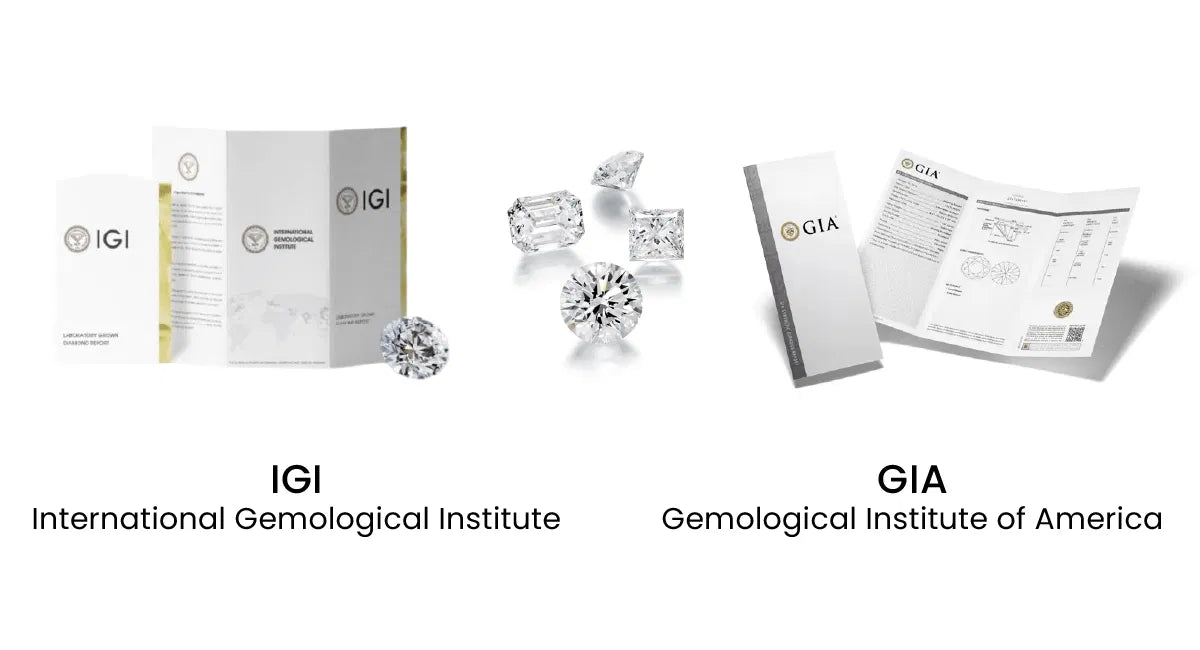When buying a diamond, certification is key. Both the International Gemological Institute (IGI) and the Gemological Institute of America (GIA) are reputable institutions that provide detailed, independent grading reports on diamond quality. However, there are differences between the two that you should be aware of:
1. Reputation and Recognition
• GIA (Gemological Institute of America): Widely considered the gold standard in diamond grading, GIA is known for its strict grading standards. Their reports are highly regarded for providing unbiased, consistent results, making GIA the preferred choice for buyers seeking the most accurate certification. GIA was also the first to introduce the 4Cs grading system, making them the most established name in diamond grading.
• IGI (International Gemological Institute): IGI has gained popularity in recent years, especially in the lab-grown diamond market. While they provide comprehensive grading, IGI reports are sometimes seen as slightly less stringent compared to GIA, particularly in the case of natural diamonds. However, IGI is widely respected for lab-grown diamonds, offering consistent and accessible certification.
Tip: If you’re buying a natural diamond, GIA certification might provide more peace of mind due to its stricter reputation. For lab-grown diamonds, IGI certification is highly reliable.
2. Grading Standards
• GIA: GIA’s grading reports are known for their high level of precision and reliability. They are especially strict when it comes to color and clarity, often grading diamonds more conservatively than other labs. GIA is known for providing an in-depth, detailed analysis of each diamond’s characteristics.
• IGI: While IGI is rigorous in its grading, particularly with lab-grown diamonds, its standards for natural diamonds are sometimes perceived as more lenient compared to GIA. For example, a diamond graded as VS1 in clarity by IGI might be graded as VS2 by GIA. This makes IGI-certified natural diamonds potentially appear slightly better on paper than they might in reality.
Tip: If you’re purchasing a high-value, natural diamond, GIA’s stricter grading standards might offer more certainty. For lab-grown diamonds, IGI’s reports are typically thorough and trusted.
3. Reporting Details
• GIA Reports: GIA’s reports are highly detailed and easy to understand. They provide full information about the diamond’s 4Cs (cut, color, clarity, carat weight) along with a diagram showcasing inclusions and blemishes. Each GIA report includes a unique serial number laser-engraved on the diamond’s girdle for identification.
• IGI Reports: IGI reports also include the 4Cs and often feature additional details about the diamond’s dimensions and proportions. IGI reports are generally regarded as user-friendly and, similar to GIA, IGI-graded diamonds can be laser-inscribed with a unique identification number.
Tip: Both GIA and IGI provide clear and detailed reports, but GIA’s diagrams may offer slightly more information on inclusions.
4. Price Difference
• GIA-certified Diamonds: Because of GIA’s stringent grading standards, diamonds certified by GIA often command a premium price, particularly for high-quality stones.
• IGI-certified Diamonds: IGI-certified diamonds may sometimes be priced slightly lower than GIA-certified stones due to differences in grading rigor. For lab-grown diamonds, however, IGI certification is widely trusted, and the price difference between GIA and IGI certification is less pronounced.
Tip: If you’re purchasing a natural diamond and want the most precise certification, GIA is a solid choice even at a higher cost. For lab-grown diamonds, IGI offers excellent value.
5. Availability
• GIA: GIA certification is more common in the natural diamond market and is often the standard for high-end retailers.
• IGI: IGI is widely recognized for lab-grown diamonds and is increasingly used by jewelers who specialize in more affordable diamonds and lab-grown options.
Final Thoughts: Which Should You Choose?
Both IGI and GIA are trusted names in the diamond industry, but the choice ultimately depends on the type of diamond you’re buying and your personal preferences:
• If you’re buying a natural diamond and are looking for the strictest and most recognized grading, GIA is often the best choice, offering peace of mind with its highly respected certification.
• If you’re purchasing a lab-grown diamond, IGI offers excellent certification with consistent grading standards, particularly in this growing market.
Choosing the right certification is an important step in ensuring your diamond’s quality and value, so always consider the reputation, grading rigor, and type of diamond when making your decision.

